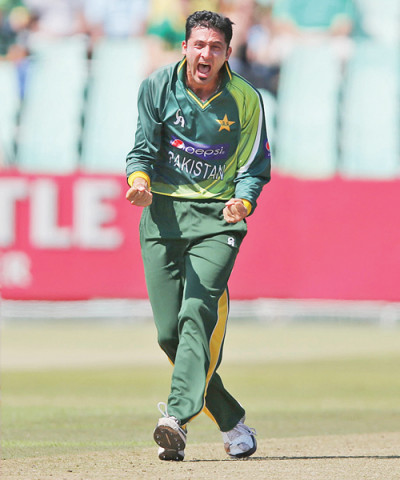Junaid’s story: From tobacco fields to the Adelaide Oval
A cricketing mercenary as a kid, Junaid is now Pakistan’s premium pacer.

From the tobacco fields of Matra to the upcoming trip Down Under where Pakistan open up their World Cup campaign at the Adelaide Oval against India, Junaid has come a long way from days of playing tapeball cricket to becoming Pakistan’s premium fast-bowler. PHOTO: AFP
Junaid, essentially a product of professional tennis ball cricket — just like Anwar Ali, Sohail Tanvir, Amir Awais Zia and Shahzeb Hasan — fell in love with tapeball cricket in his early days.
Unfortunately, the 25-year-old who hails from a small Matra village near Sawabi, had no proper grounds available to him near home and this led him to the main city, where he would play competitive matches after encouraging teams to hire his skills.
“I started playing tapeball cricket at the age of 13 and as I grew older, I became a quick bowler,” Junaid told The Express Tribune. “Later on, the teams began to hire me to play for them in bigger tournaments. If I would play in a final for someone, I used to charge Rs2,000 to Rs3,000, while for a full tournament it would be somewhere between Rs8,000 and Rs10,000.”
A mischievous youngster, Junaid and his friends would spend many of their days secretly going out to get fruits and targeting their neighbour’s bulbs, a cheeky way of challenging each other’s accuracy. However, his group was often caught and punished with a beating from either their neighbours or their families.
Brought up in Sawabi, Junaid had a special love for his families’ farms — where they had tobacco crops — and would spend hours in the fields with the farmers. However, his father refused to allow him to work despite the bowler desperate to literally get his hands dirty.
But Junaid had other things in mind to keep his passionate nature alive. With the lack of facilities available to him during his early days, he and his friends would anxiously wait for the harvesting season to arrive so they could resume their love affair with cricket.
“Our village only had crops all over so there were no playing fields. We would just wait for the crops to be harvested in order to get two months’ playing time. Once the harvesting was completed, we would gather and level the land by using spades and shovels,” he recalled.
“Dozens of people would then run on the land for a couple of days to make sure that the field is even enough to play. After levelling the field, we would collect stones and extra sand to make a hard pitch on it, which was just slightly higher from the ground. And thus, my love for cricket developed.”
It happened by chance but it was good enough for him; good enough to give his cricketing journey a big boost. On his cousin’s insistence, Junaid ended up bowling with the hard ball as he was made to give trials for the Abbottabad U19 team after their tapeball match had ended early in Sawabi. He was around 15 when he bowled at the nets, with selector Ehteshamuddin monitoring the trials.
And, it took him just a few balls to impress Ehtesham with his seam movement.

“As I started bowling, I wasn’t getting the same speed but my ball was moving both ways and the batsmen were not able to play it. Sincerely speaking, I had no idea how the ball was tailing in and moving out,” Junaid, the second of three siblings, recalled. “After that, Ehtesham called me to know my age. I told him that I was just over 14 so he asked me to play at the U16 level because I was too young.”
He made quick strides and performed well in both U16 and U19 inter-regional tournaments, which prompted a call-up to the Pakistan U19 side, where he and Amir played together. Both made their marks but Amir was the first to take international cricket by storm while Junaid followed in 2011 after strong performances in both domestic cricket and Pakistan A.
Even after becoming a part of the national team, Junaid continued his love affair with tapeball cricket and kept on playing for a while longer.
Coming from a well-educated family, his studies were left behind after eight grade, but he managed to complete his intermediate exams after cricket became the primary focus in his life.
He credits his father, Matiullah and Amir Nawab — local cricketing heads of Sawabi and Abbottabad respectively — for their initial support and his cousins for accompanying him to Abbottabad, as his father would not allow him to go there alone given the four-hour drive.
Even though his life has seen a drastic change, Junaid is still in touch with his roots; he loves spending time with the farmers and his childhood friends.
“I and my family take pride in my name being part of the international cricket fraternity, but that stardom is only for the neutrals,” he said. “I’m still the same with people who know me from my early days and spend quality time with them on the field.
“I’m lucky that I was spotted and praised by Wasim Akram after breaking into international cricket. He’s helped Pakistani bowlers a lot and he advises me regularly even without me asking.”
For Pakistan’s premium fast bowler, it has been a long journey from harvested fields of tobacco to the lush grass of the awaiting grounds Down Under, but Junaid still feels equally comfortable on both.
Published in The Express Tribune, January 19th, 2015.
Like Sports on Facebook, follow @ETribuneSports on Twitter to stay informed and join in the conversation.



















COMMENTS
Comments are moderated and generally will be posted if they are on-topic and not abusive.
For more information, please see our Comments FAQ